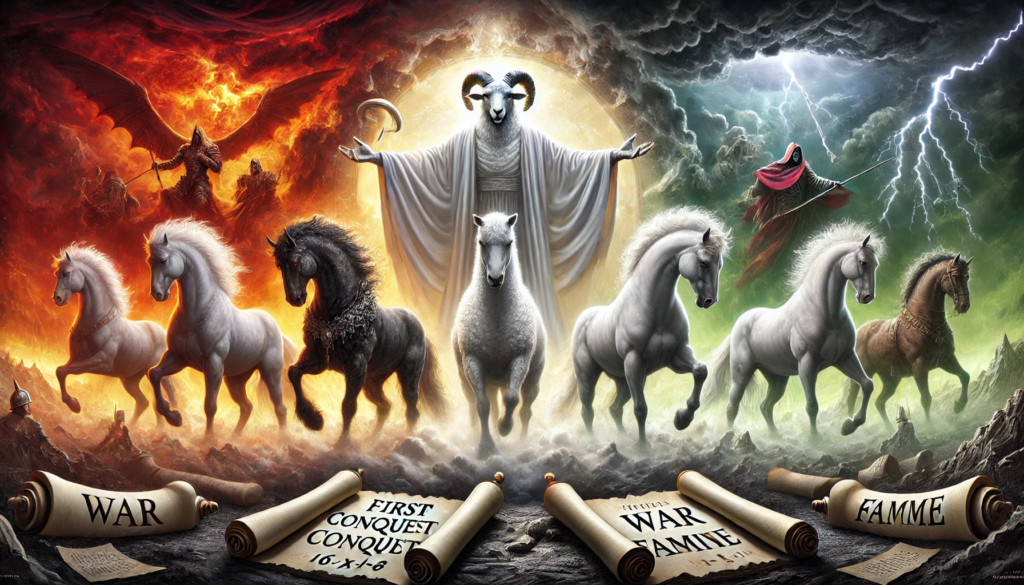Revelation #11: Revelation Chapter 6:1-8, The Lamb Opens the First Six Seals
Revelation #11: Revelation Chapter 6:1-8, The Lamb Opens the First Six Seals
Summary of Revelation 6 : The Lamb and the Seals
The opening of the seals introduces a prophetic sequence of divine judgments. While only six seals are opened in this chapter, each brings a unique vision of what is to come:
- The first four seals reveal the Four Horsemen of the Apocalypse, each riding a horse of a different color and bringing conquest, war, famine, and death.
- The fifth seal reveals the souls of the martyrs calling for justice.
- The sixth seal unveils cosmic disturbances, symbolizing the turmoil in the heavens and on the earth.
The Four Horsemen and Their Symbolism
The First Seal: The White Horse (Revelation 6:1-2)
As the first seal is broken, a figure on a white horse appears. Holding a bow, he is given a crown, symbolizing conquest. There is ongoing debate as to the identity of this rider. Some suggest that he represents Christ, symbolizing a form of righteous victory. However, others, aligning with the context of tribulation and deception, suggest this rider symbolizes a false peace, possibly representing the Antichrist who initially rises with the guise of peace before bringing destruction.
The Second Seal: The Red Horse (Revelation 6:3-4)
Upon the opening of the second seal, a rider on a fiery red horse is revealed. This horseman wields a great sword, symbolizing warfare and the removal of peace from the earth. Following a period of false peace, humanity plunges into unprecedented conflict, signaling the arrival of a global war that devastates nations. This is a clear departure from the peace initially established, marking the start of widespread conflict.
The Third Seal: The Black Horse (Revelation 6:5-6)
The third horse, black in color, appears as a symbol of famine. The rider holds a set of scales, representing the rationing of resources. A voice from among the creatures describes a scenario where basic food items—wheat and barley—are available only at exorbitant prices, while luxuries like oil and wine remain untouched. This symbolizes a time of economic disparity, where essential resources are scarce, yet the wealthy are insulated from the struggles of the general populace. The imagery emphasizes the suffering of the common people during this period, reflecting the consequences of conflict and scarcity.
The Fourth Seal: The Pale Horse (Revelation 6:7-8)
The final horseman rides a pale or sickly green horse, with death as his companion. This rider has the authority to kill a quarter of the earth’s population through various means—war, famine, disease, and even wild beasts. This vision underscores the comprehensive nature of the tribulation judgments, which bring a wide-scale devastation across the earth. Here, death represents not just a physical demise but also spiritual consequences, foreshadowing further judgment in the chapters that follow.
Interpretations of Revelation’s Judgments
The interpretations of these passages generally fall into two main schools of thought:
- Historical Interpretation: Some believe that Revelation reflects events that the Church has endured throughout history. This approach sees the Apocalypse as a symbolic account of ongoing struggles, such as those experienced by early Christians and the Church throughout the ages. Proponents of this view, however, often face challenges in aligning specific events with the exact sequence and scale described in Revelation.
- Literal or Symbolic Interpretation: Many evangelical Christians interpret the Revelation prophecies as future events that will be fulfilled precisely. This view holds that while symbolic language is used, the judgments themselves are literal. Given that prophecies of Jesus’ first coming were fulfilled literally, many believe the same approach applies to the second coming and the end times.
The Fifth and Sixth Seals: Souls of the Martyrs and Cosmic Disturbances
The Fifth Seal: Martyrs Under the Altar (Revelation 6:9-11)
This seal reveals the souls of the martyrs under an altar, crying out for justice. They are told to wait until the number of their fellow servants and brethren is complete. This symbolizes the suffering of believers and a call for divine retribution, reminding readers of God’s awareness of their sacrifices and his promise of eventual justice.
The Sixth Seal: Cosmic Chaos (Revelation 6:12-17)
The sixth seal brings a terrifying vision of natural disasters—earthquakes, the sun turning black, the moon turning red, and stars falling from the sky. This series of events signals that humanity cannot escape the consequences of rebellion against God. Such scenes highlight the unavoidable nature of divine judgment, as people from all walks of life attempt to hide from God’s wrath, recognizing the power and finality of these apocalyptic events.

Conclusion: The Significance of Revelation’s Judgments
The six seals of Revelation chapter 6 foreshadow an unprecedented period of turmoil and divine intervention. Each judgment illustrates a key aspect of humanity’s departure from God and the ensuing consequences. While many interpretations seek to contextualize these events, the central message remains a call for repentance and faith in Christ.
As believers anticipate a new heaven and a new earth, they find assurance in God’s promise to establish a kingdom where peace and justice prevail. The imagery of the Four Horsemen, the martyrs, and the cosmic upheaval powerfully emphasizes the urgency of aligning oneself with God’s will, as well as the ultimate triumph of God’s justice and redemption.
-sermon series by Pastor Michel Bohrer
Listen to the KJV New Testament from Matthew to Revelation as a Podcast!
See Related Pages:
Sermons: key points from the series Revelation ; 50 facts/speculations on 666 in the Bible ;30 failed doomsday prophecies; Prophecies of Israel in the Bible: Fulfilled, Unfulfilled ; Bible Study on Revelation ; 5 Ways the Book of Revelation Has Influenced Modern Culture ; Art and Symbolism of Revelation ;Sermon Series Revelation ; Questions and Answers on Revelation
